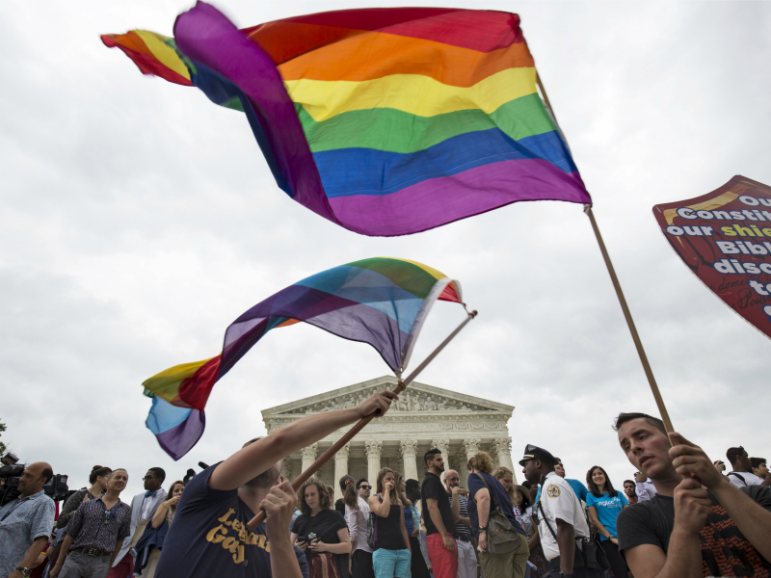LONDON (RNS) — Bishops from the Global South announced during a meeting of leaders of the Anglican Communion that they will refuse Holy Communion from bishops with gay partners and from those who support same-sex marriage.
The announcement came on Friday morning (July 29) at the Lambeth Conference, being held in Canterbury, as the orthodox bishops also pressed for re-affirmation of traditional teaching on marriage. It came a day after 100 people, including a dozen bishops, joined a walk at the Conference’s Canterbury campus venue to show solidarity with LGBTQ people.
The move also highlights the deep divisions in the Communion over same-sex marriage; even before the conference began, documents that referred to gay relationships caused a huge row.
RELATED: Same-sex marriage sparks divisive debate at twice-delayed Lambeth Conference
In a statement, the Global South Fellowship of Anglican Churches (GSFA) — which claims to represent 75% of the Anglican Communion — said it will be tabling its own resolution, or Lambeth Call, to reaffirm Lambeth Resolution 1.10 as the official church teaching on marriage and sexuality. That resolution was formally passed at the Lambeth Conference in 1998 and described marriage as a life-long commitment between a man and a woman, thus outlawing same-sex unions.
The leaders of GSFA say that organizers of the 2022 Lambeth Conference have failed to recognize that the resolution “is not just about sex and marriage, but fundamentally about the authority of the Bible which Anglicans believe to be central to faith and order.”
Archbishop Justin Badi of South Sudan, the GSFA chair, said the fellowship is also calling on the Anglican Communion to impose sanctions on provinces that ordain bishops in same-sex relationships and allow same-sex marriages. These provinces include the Episcopal Church in the United States, the Episcopal Anglican Church of Brazil, the Anglican Church of Canada, the Anglican Church of Aotearoa, New Zealand and Polynesia, the Scottish Episcopal Church and the Church in Wales.
According to Archbishop Badi, the Communion has been “for far too long driven by the views of the West” and ignored voices from the Global South.
“We often feel that our voices are not listened to, or respected,” he said. “Today, in Canterbury, we may be ‘gathered together,’ but we most certainly cannot ‘walk together’ until provinces which have gone against Scripture — and the will of the consensus of the bishops — repent and return to orthodoxy.”
The latest fight over same-sex marriage first erupted on the eve of the conference, when bishops received their draft of conference documents, called Lambeth Calls. Those documents included the statement: “It is the mind of the Anglican Communion as a whole that same-gender marriage is not permissible.”
The documents were later amended, after protests from supporters of same-sex marriage, to note the differences in views among Anglican provinces. The statement now notes that while many provinces ban same-gender marriages, other provinces “have blessed and welcomed same-sex union/marriage after careful theological reflection and a process of reception.”
This latest spat over same-sex marriage threatens to overshadow the conference, the first to be held in 14 years. Although 650 bishops from around the globe are attending, hundreds of others, mostly from the Global South, have boycotted it in protest of support from some parts of the Communion for same-sex marriage.
At the launch press conference, the Archbishop of Canterbury, Justin Welby, stressed that the conference is not a synod and not a legislative body but was a place where the bishops could come together. Among the other issues that will be discussed are climate change, poverty, discipleship and reconciliation.
Work toward the Lambeth Conference began 18 months ago when bishops met in groups via Zoom and will continue after the conference ends on Aug. 8 with bishops going back to their provinces for further discussions.
During the launch press conference, Bishop Tim Thornton, who was responsible for drawing up the Lambeth Calls documents with a seven-strong sub-group, apologized for “lack of clarity” in the process.
Archbishop Welby said during the press conference that Resolution 1.10 was “still very much part of the Anglican Communion,” but not universally accepted.
“There is deep division,” he said. “It will be to decide in each province and diocese.”
RELATED: Archbishop resigns from Anglican Church of Canada over sexual misconduct





